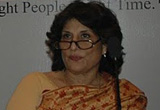 There’s been a huge amount of criticism in India following budgetary cuts imposed on social sector programmes in this year’s budget, the most prominent being the 50% cut in the Ministry of Women and Child Development, custodian of the Integrated Child Development (ICDS) programme, and supposed guardian of India’s nutritional wellbeing. To compensate for this the central government has raised the states’ share of central taxes by 10%, but we are not still very clear how the arithmetic will work, and how much the states will have to contribute from their own budgets, if they want to continue welfare programmes at the same levels.
There’s been a huge amount of criticism in India following budgetary cuts imposed on social sector programmes in this year’s budget, the most prominent being the 50% cut in the Ministry of Women and Child Development, custodian of the Integrated Child Development (ICDS) programme, and supposed guardian of India’s nutritional wellbeing. To compensate for this the central government has raised the states’ share of central taxes by 10%, but we are not still very clear how the arithmetic will work, and how much the states will have to contribute from their own budgets, if they want to continue welfare programmes at the same levels.
These cuts did come as a bit of a surprise, as normal governmental practice in social sectors is that development programmes get carried over to the next year in a mechanical manner, with a token budget increase, without any evaluation. It has also become quite the norm, both in governmental and non-governmental circles to measure commitment to “welfare” through the size of budget allocations and expenditures, rather than checking that money has been utilised properly or that outcomes have been achieved. While social evangelists called the budget cuts an attack on the welfare state, many development experts saw them as the beginning of the much needed overhaul of the “social sectors” of government. It is a sad fact that the welfare state is pretty much in a state of collapse, although it created the foundation for modern India, and its social and economic growth. Several development programmes have reached a state of diminishing or nil returns, mostly because of corruption and cronyism between the political class, budget handlers, and the implementation machinery, that has steadily entrenched itself over the decades. Money meant for welfare programmes is not reaching the poor, but is being siphoned off.
Malnutrition is one area where the welfare state has not made much impact. Let me quote the findings of India’s first diet surveys conducted between 1935 and 1948,which refer to inadequate consumption of protective foods, good quality protein, minerals and vitamins, and that “in terms of average income it would hardly be possible for more than 30 % of the population to feed themselves on an adequate scale.” Shockingly, the position seems almost identical half a century later, with the national nutrition monitoring board repeat surveys of 1988-90 and 1996-97 throwing up almost identical findings regarding calorie-protein and micronutrient deficit in people’s diet.
Though India’s poverty has reduced, and the character and aspirations of the poor have changed substantially since 1947, its welfare programmes have remained more or less the same. Today, privately owned play schools, primary schools, and medical clinics have mushroomed in the better developed rural areas, and it has become a matter of status and pride for families at the edge of the poverty line, or having just stepped out of it, to send their children not to anganwadis (ICDS pre-school centres), government health centres or schools, but to private schools and clinics.
Off the record, there is agreement that the 50% budget cut in ICDS may not adversely affect its actual operations on the ground. But yes, its fictional operations and the rental nexus will surely receive a massive jolt. This is just one example of the welfare state crippled by rental cronyism.
The National Institution for Transforming India, (NITI Aayog), successor to the planning commission that was disbanded last year, appears to be in the process of rationalizing social development schemes and their financial parameters. This would also be an appropriate time to revise their objectives, interventions, and delivery mechanisms, and match them to needs and aspirations of the poorest layer of contemporary Indian society.
See also:
- Deep cuts to India’s health spending will delay universal access to healthcare
- Bureaucracy and budget revision: how spending cuts are affecting India’s public health programmes
Veena S Rao is adviser, Karnataka Nutrition Mission.
Competing interests: I declare that I have read and understood the BMJ policy on declaration of interests, and I hereby declare the following interest: I was an adviser to Britannia Nutrition Foundation, but left mid 2013.